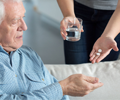Tag Archives: ticagrelor
June 2021 Br J Cardiol 2021;28:67–9 doi:10.5837/bjc.2021.026
Reducing antithrombotic-related bleeding risk in urgent and emergency cardiac surgery
Amer Harky, Abdul Badran
| Full textOctober 2018 Br J Cardiol 2018;25:135–7
European Society of Cardiology 2018 Congress in briefs
BJC Staff
| Full text
September 2017 Br J Cardiol 2017;24(suppl 1):S10–S15 doi:10.5837/bjc.2017.s02
Dual antiplatelet therapy following acute coronary syndromes: optimal regimens and duration of therapy
Wael Sumaya, Robert F Storey
| Full text




